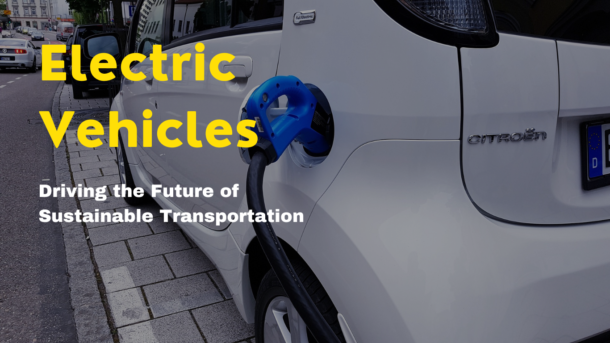Electric vehicles (EVs) have gone a long way in recent years, becoming popular as a viable alternative to traditional gas-powered automobiles. As worldwide concern about climate change and air pollution grows, electric vehicles (EVs) provide a more sustainable and ecologically friendly means of transportation. In this in-depth post, we’ll look at the history of electric cars, the multiple benefits they provide, and the exciting prospects for the future of electric transportation.

1) The History of Electric Vehicles
1.1. Early Beginnings
Electric cars have been present since the early 1800s when innovators all around the world began experimenting with battery-powered vehicles. The first functional electric automobiles appeared in the late 1800s, but their popularity dwindled as mass-produced petrol vehicles became available.
1.2. The Modern EV Renaissance
The present revival of electric vehicles can be related to increased worries about climate change, air pollution, and oil price instability. Battery technology advancements and the development of electric powertrains have enabled the manufacture of electric cars with improved performance, greater range, and faster charging periods.
2) The Benefits of Electric Vehicles
2.1. Environmental Impact
One of the major advantages of electric cars is their lower environmental effect. EVs have zero tailpipe emissions, which helps to reduce air pollution and greenhouse gas emissions. Furthermore, electric cars may become even more ecologically benign when fuelled by renewable energy sources such as solar or wind.
2.2. Energy Efficiency
Electric vehicles use less energy than typical gas-powered vehicles because they convert a larger percentage of electrical energy into motion. This efficiency translates into decreased energy expenditures, making EVs more cost-effective to operate over time.
2.3. Lower Operating and Maintenance Costs
Electric cars feature fewer moving parts than traditional vehicles, which reduces the chance of mechanical problems and lowers maintenance expenses. Furthermore, electric vehicles do not require oil changes, and their regenerative braking systems save wear on brake pads and rotors, lowering maintenance costs even further.
3) The Future of Electric Vehicles
3.1. Advances in Battery Technology
Battery technology developments will be key to the mainstream adoption of electric cars. EVs will be able to offer increased range and cost as batteries get more energy-dense, lighter, and cheaper, making them even more appealing to customers.
3.2. Charging Infrastructure Expansion
The development of charging infrastructure is critical for the electric car market’s continuing growth. As more public and private institutions invest in charging stations, EV users will have more convenient charging alternatives, easing range anxiety worries.
3.3. Autonomous and Connected Vehicles
Many top manufacturers are developing self-driving EVs, putting electric vehicles at the forefront of the autonomous and connected vehicle revolution. As this technology progresses, we may anticipate electric cars to play a larger part in revolutionizing transportation in the future.
4) Tips for Choosing the Right Electric Vehicle
4.1. Determine Your Driving Needs
Consider your driving patterns and needs before investing in an electric car. If you have a long daily commute or routinely take long road trips, be sure the range of the EV is enough.
4.2. Research Charging Options
Examine the availability of charging outlets in your neighborhood and along your typical journeys. If you intend to charge your EV at home, be sure your electrical infrastructure can support the charging equipment.
4.3. Compare Incentives and Rebates
Many nations provide incentives and refunds for electric car purchases, which can drastically lower the entire cost. Investigate the various incentives in your area and include them in your decision-making process.
Conclusion
Electric cars are a big step forward in the pursuit of sustainable transportation, providing several environmental, economic, and efficiency advantages. EVs will become more accessible and appealing to customers globally as battery technology advances and charging infrastructure grows. You may discover the ideal electric vehicle to help you contribute to a cleaner, greener future by carefully assessing your driving demands and the available possibilities.
Read More
Wearable Technology: Revolutionizing the Future of Smart Devices
The Ultimate Guide to Smart Home Technology: Revolutionizing Modern Living
5G Networks: A Complete Introduction about 5G Networks
VR vs AR | What are Virtual Reality and Augmented Reality?
A Complete Details About Computing Power & Quantum Computing
FAQs
What are the main advantages of electric vehicles?
Electric cars have several advantages, including decreased environmental impact, energy efficiency, cheaper operating and maintenance costs, and the ability to integrate with renewable energy sources.
How far can electric vehicles travel on a single charge?
Electric vehicle range varies based on model and battery size. Some electric vehicles may go more than 300 miles on a single charge, while others may only drive 100-200 miles. It is critical to select an EV with a range that matches your driving requirements.
How long does it take to charge an electric vehicle?
Charging periods for electric vehicles vary depending on battery capacity, charging station power output, and charger type. Level 1 chargers (120V outlets) need the most time to charge, however, Level 2 chargers (240V outlets) and DC fast chargers can drastically cut charging periods. Charge periods range from 30 minutes for fast chargers to 8-12 hours for both Level 1 & Level 2 chargers.
Are electric vehicles more expensive than conventional cars?
While the initial cost of electric cars is higher than that of gas-powered vehicles, the future savings in maintenance and fuel expenditures can more than outweigh the price difference. In addition, government rewards and benefits can assist reduce the total expenses associated with EV ownership.
What types of electric vehicles are available?
Electric cars are classified into three types: battery electric vehicles (BEVs), plug-in hybrid electric vehicles (PHEVs), and fuel cell electric vehicles (FCEVs). BEVs are completely electric, PHEVs combine a battery with an internal combustion engine, and FCEVs generate power using hydrogen fuel cells.
How do I charge an electric vehicle at home?
Installing a level two charge location, which needs a 240V outlet, is often required to charge an electric car at home. It is critical to ensure that the electrical system in your house can manage the extra load and to contact a trained electrician to set up the charging equipment.
Can electric vehicles be charged using renewable energy?
Yes, renewable energy sources such as solar or wind power may be used to charge electric automobiles. Homeowners may reduce their environmental effects by installing solar panels or charging their EVs with power from renewable energy suppliers.
Are electric vehicles reliable?
Electric cars are often regarded as dependable since they have fewer moving parts than traditional vehicles, lowering the probability of mechanical problems. Furthermore, electric motors and batteries have proven to be long-lasting, and several manufacturers provide extensive guarantees for their electric cars.
Are electric vehicles safe?
Electric cars are subjected to the same stringent safety testing as traditional vehicles, and several have obtained top safety ratings from organizations such as the National Highway Traffic Safety Administration (NHTSA) and the Insurance Institute for Highway Safety (IIHS). Furthermore, electric cars frequently have a lower center of gravity, which improves handling and lowers the chance of rollover accidents.
What is the environmental impact of producing electric vehicle batteries?
The mining and processing of raw minerals such as lithium, cobalt, and nickel can result in greenhouse gas emissions and other pollutants during the construction of electric car batteries. However, the whole lifetime emissions of electric cars, including battery manufacture, remain much lower than those of conventional vehicles, particularly when charged with renewable energy sources.






1 Response
[…] TrendingElectric Vehicles: Driving the Future of Sustainable Transportation […]